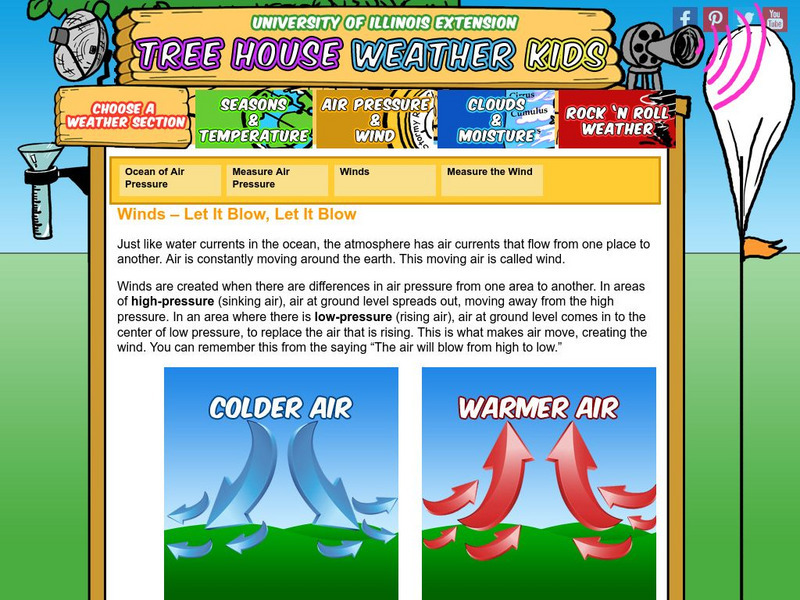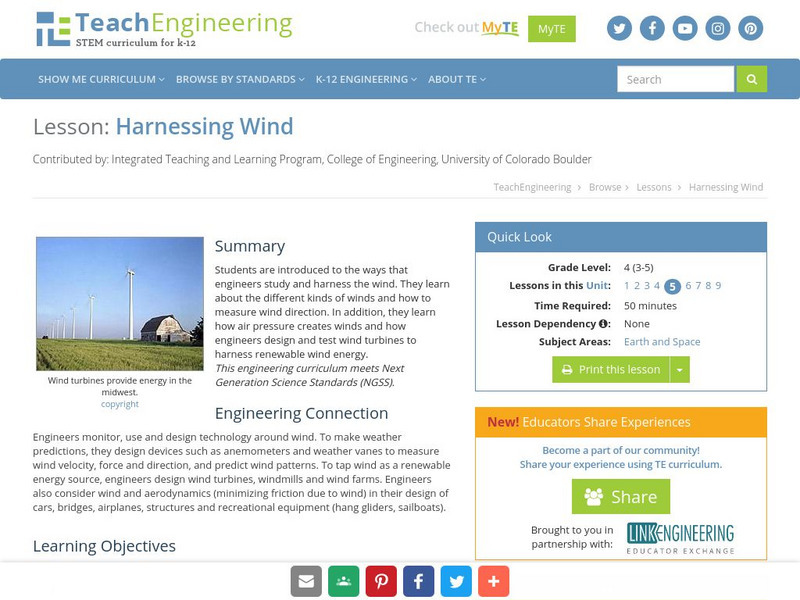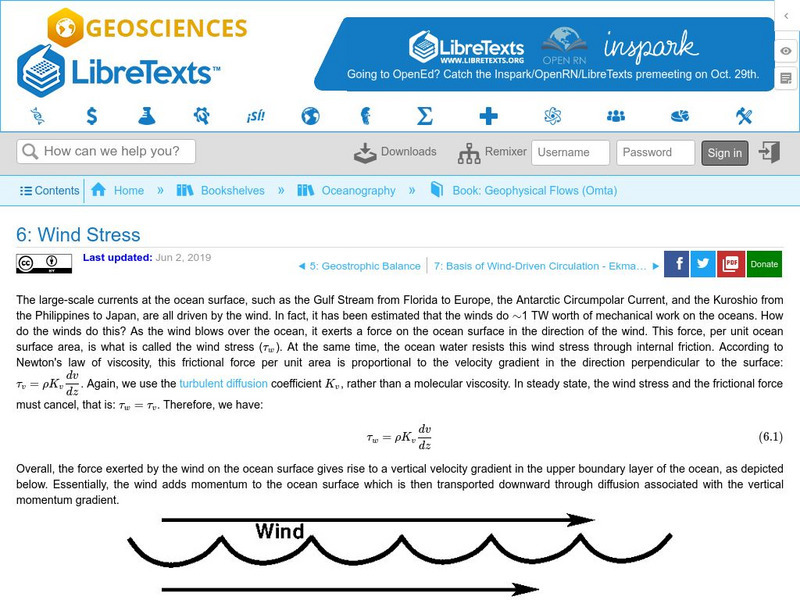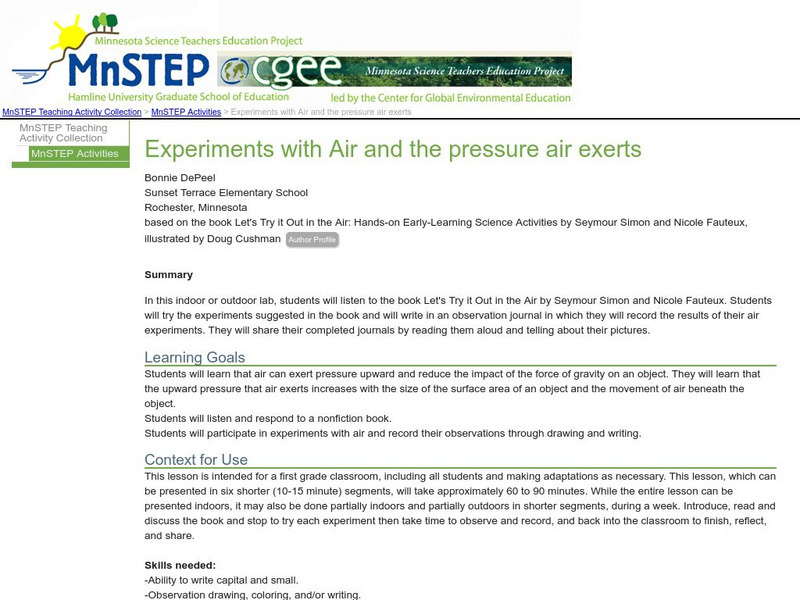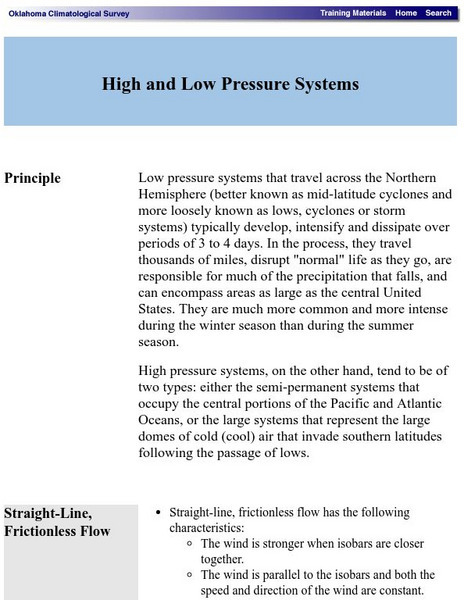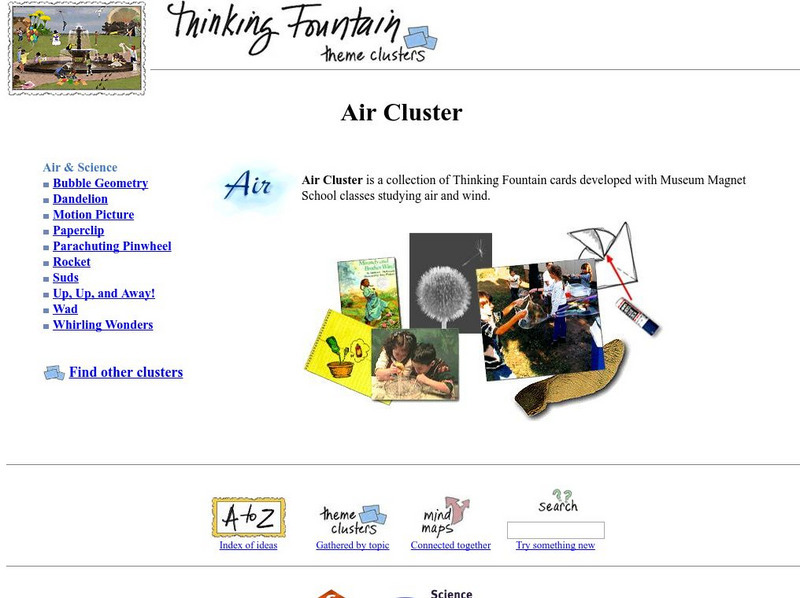Curated OER
Build Your Own Weather Station
Studens experiment with temperatures. In this science lesson, students make their own weather station by heating one bottle and keeping the water in another bottle at room temperature.
Curated OER
Geographic Effects on Precipitation, Water Vapor and Temperature
Students investigate the factors affecting climate using Live Access Server. In this geography lesson plan, students graph atmospheric data using Excel spreadsheet. They compare and contrast temperature, precipitation and water vapor of...
University of Illinois
University of Illinois Extension: Tree House Weather Kids: Air Pressure and Wind: Under an Ocean of Air Pressure
Animated resource helps young researchers understand air pressure and how we measure it.
Scholastic
Scholastic: Study Jams! Science: Weather & Climate: Air Pressure and Wind
A video and a short multiple-choice quiz on the topic of air pressure and wind. It explains what makes air pressure change, how we measure it, how wind is created, and types of winds.
University of Illinois
University of Illinois Extension: Tree House Weather Kids: Air Pressure and Wind: Winds: Let It Blow
Animated interactive helps young researchers understand how winds develop.
Science Buddies
Science Buddies: A Change in the Winds: Studying Bernoulli's Principle
You can actually make objects come together by blowing air between them. This is a simple way of implementing Bernoulli's principle. Find out how wind changes air pressure to bring to objects together in this easy and fun science fair...
University of Illinois
University of Illinois Urbana Champaign: Forces and Winds
What causes wind? How does wind affect our weather? This website is neatly organized into topics about pressure, gradient force, Coriolis force, geostrophic wind, gradient wind, friction, boundary layer wind, and sea and land breezes....
TeachEngineering
Teach Engineering: Harnessing Wind
This activity introduces the ways that engineers study and harness the wind. Students will learn about the different kinds of winds and how to measure wind direction. In addition, students will learn how air pressure creates winds and...
Dan Satterfield
Dan's Wild Weather Page: Winds
Find out about wind and jet streams and the tools that measure them.
Science Buddies
Science Buddies: How Does a Wind Meter Work?
On a windy day it is hard to keep your hat on. The power of the wind can even be strong enough to power large wind turbines to make electricity. In this experiment, find out how you can make your own instrument to measure the speed and...
Utah Education Network
Uen: Measuring Wind Speed
Fourth graders measure wind speed over the course of a week and graph the results.
University of Illinois
University of Illinois Urbana Champaign: Ww2010: Forces and Winds: Pressure Gradient Force
Explains what a pressure gradient is and how it produces air movement.
Libre Text
Libre Text: Wind Stress
The force exerted by the wind on the ocean surface gives rise to a vertical velocity gradient in the upper boundary layer of the ocean. Essentially, the wind adds momentum to the ocean surface which is then transported downward through...
Science Education Resource Center at Carleton College
Serc: Experiments With Air and the Pressure Air Exerts
In this indoor or outdoor lab, students listen to the book Let's Try it Out in the Air. Then they have an opportunity to try the air experiments suggested in the book and write in an observation journal.
Science Education Resource Center at Carleton College
Serc: Lab 6: Why Keep an Eye on the Barometer?
A lab experiment in a series of experiments that explores hurricanes. For this particular lab, students will study data from 2005 hurricane season including Hurricane Katrina. Students compare air pressure and wind speed and also "they...
CPALMS
Florida State University Cpalms: Florida Students: How's the Weather?
A tutorial that describes the five factors that determine the weather in a particular place and time. The factors discussed in this tutorial are air temperature, air pressure, humidity, wind, and precipitation. A PDF file of the tutorial...
American Geosciences Institute
American Geosciences Institute: Wind Classroom Activities
When air is warmed, it expands and becomes less dense. As the air becomes less dense, its air pressure decreases. This occurs because molecules in warm air have greater kinetic energy (energy of motion) than in cold air. As the molecules...
Ministry of Education, Sports & Culture (Samoa) Government
Mesc: Samoa School Net: Forces to Make Weather: Weather & Water Cycle
Explains three forces of nature and how they impact the weather. These include infrared rays from the sun, differences in air pressure, and wind flow when hot and cold air masses meet. Supported by lots of visuals.
University Corporation for Atmospheric Research
Ucar: Wind
Wind is air moving from a place that has higher pressure to one that has lower pressure. Sometimes wind is just a light breeze and other times it is strong enough to blow the roofs off buildings.
American Museum of Natural History
American Museum of Natural History: Make Your Own Weather Station
Students can plan and carry out investigations of local weather patterns by building their own weather stations to collect observations of various weather conditions: rainfall, wind direction, and air pressure.
University Corporation for Atmospheric Research
Ucar: How Weather Affects Air Quality
How is air pollution affected by weather? Some types of pollution are worse in the summer heat, while others are worse in cold winter weather.
Oklahoma Mesonet
University of Oklahoma: High and Low Pressure
This University of Oklahoma meteorology tutorial explores both high and low pressure systems--how they form and the different forms they take.
Science Museum of Minnesota
Science Museum of Minnesota: Air Cluster
Interesting site with links to activities about wind and air in many forms. Browse the different activities and investigations on the properties of air on the toolbar to the left of the page.
John F. Kennedy Center
The Kennedy Center: Lesson: Weather and Wind
Here's an engaging activity to incorporate dance into your science lessons on weather! Students study wind, and various weather patterns, then create their own dance to illustrate what they have learned. Provides links to more...






